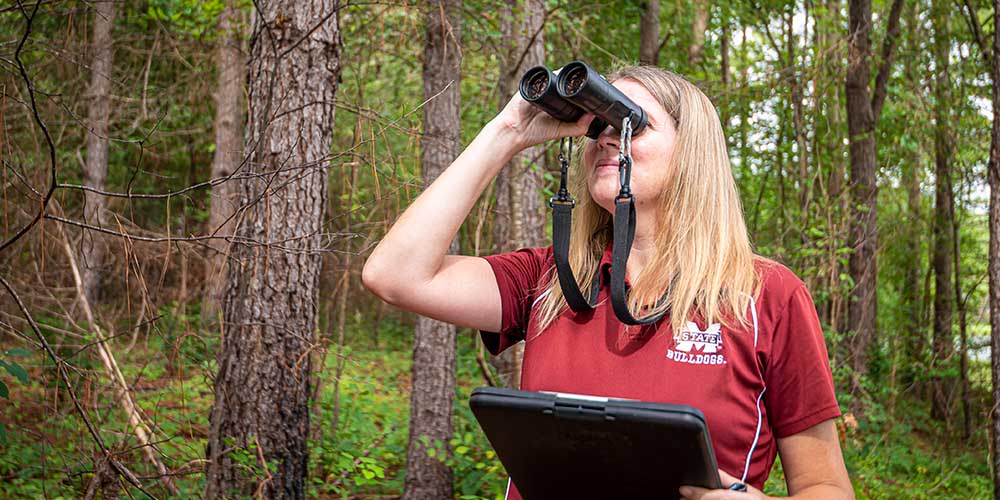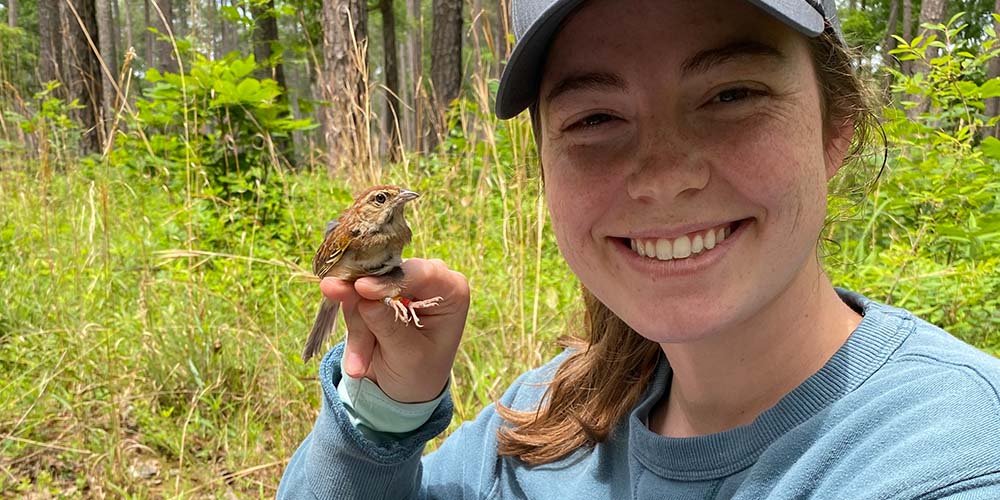Related Stories
Habitat Stories

The Tombigbee Forest Bird Partnership Helps Bird Conservation Soar in Working Forests
Over 62% of Mississippi's land base is forested, giving the Magnolia State a $13.8 billion-dollar forestry and forest products enterprise. Forest and Wildlife Research Center scientists are part of the Tombigbee Forest Bird Partnership (TFBP). The partnership is led by Emily Jo "EJ" Williams, vice president of the American Bird Conservancy's Southeast and Atlantic Coast region, whose goals include communicating the value of working forests and developing and conducting demonstration and research activities. The goal of the team is to demonstrate values of sustainable forest management for bid conservation and also identifying ways to maintain and enhance values for birds, especially those in decline. Dr. Kristine Evans, associate professor in the Department of Wildlife, Fisheries and Aquaculture and an FWRC scientist, has long studied forested habitats for landbirds.
Evans conducts research and monitoring in collaboration with TFBP partners as well and recently evaluated how forest management activities influence species diversity and abundance at the landscape scale. Most recently, as technical advisory team chair for the East Gulf Coastal Plain Joint Venture, she helped create the East Gulf Coastal Plain Landbird Conservation Plan. In another project, Evans is assessing plant-pollinator-bird relationships on Weyerhaeuser-managed forests in Mississippi and Westervelt-managed forests in Alabama. Williams also discussed the involvement of the Mississippi Band of Choctaw Indians, who have about 28,000 acres of forested land. The Choctaw are in the process of rebuilding their dictionary, which provides the chance to learn more about the cultural importance and bird names in their native language.
The American Bird Conservancy and International Paper fund the partnership with in-kind donations from Weyerhaeuser, the Westervelt Company, and C.A. Barge Timberlands LP. In addition to Evans, Dr. Mark McConnell, MSU assistant professor in wildlife, fisheries and aquaculture, also collaborates on the work.
2022

Research Designed to Create Beneficial Dynamics Between Lake Management and Water Regimes
Dr. Mike Colvin, associate professor, DR. J. Brian Davis, James C. Kennedy Endowed Associate Professor in Waterfowl and Wetlands Conservation, and their team of graduate students in the Department of Wildlife, Fisheries and Aquaculture, are assessing the impact of management practices on fisheries, birds, and plant communities in Bluff Lake and creating a model to assist managers in making scientifically informed decisions as water levels expand and recede. One part of the study looked at how common sportfish respond to drastic changes in water volume and how those changes affect fishing in those waters.
They also looked at how drawdowns, a management practice conducted to encourage growth of plants that feed ducks and birds, affects fish communities. After three years of research, the team designed a model that adequately quantifies possible outcomes of water level fluctuations and assesses benefits of various water level management decisions, taking into consideration the impact on wildlife and fishing conditions.
2021

Increasing Habitats for Southeastern Birds and Trees
Wildlife, fisheries and aquaculture major and undergraduate researcher Kim Lowery has been developing her research skills working on two projects: one studying ways to improve pollinator populations across the Black Prairie Belt region and also assisting on a project studying how Bachman's sparrows and other birds use the Sam D. Hamilton Noxubee Wildlife Refuge. Lowery and the pollinator team assessed the establishment rates of 30 recommended pollinator species at experimental plots in Clay County, Mississippi from 2018 to 2020 and studied how they responded to prescribed fires. The information from this project will help develop and target regionally effective seed mixes, and the team's work is being submitted to peer-review publications. For the Bachman's sparrow project, Lowery assisted graduate student Holly Todaro in her study of habitat selection for these quickly declining songbirds.
Lowery said that there isn't much knowledge about how these birds use the resources in their chosen open-canopy pine forest habitats, so the knowledge gained will help inform better habitat management recommendations for the species.